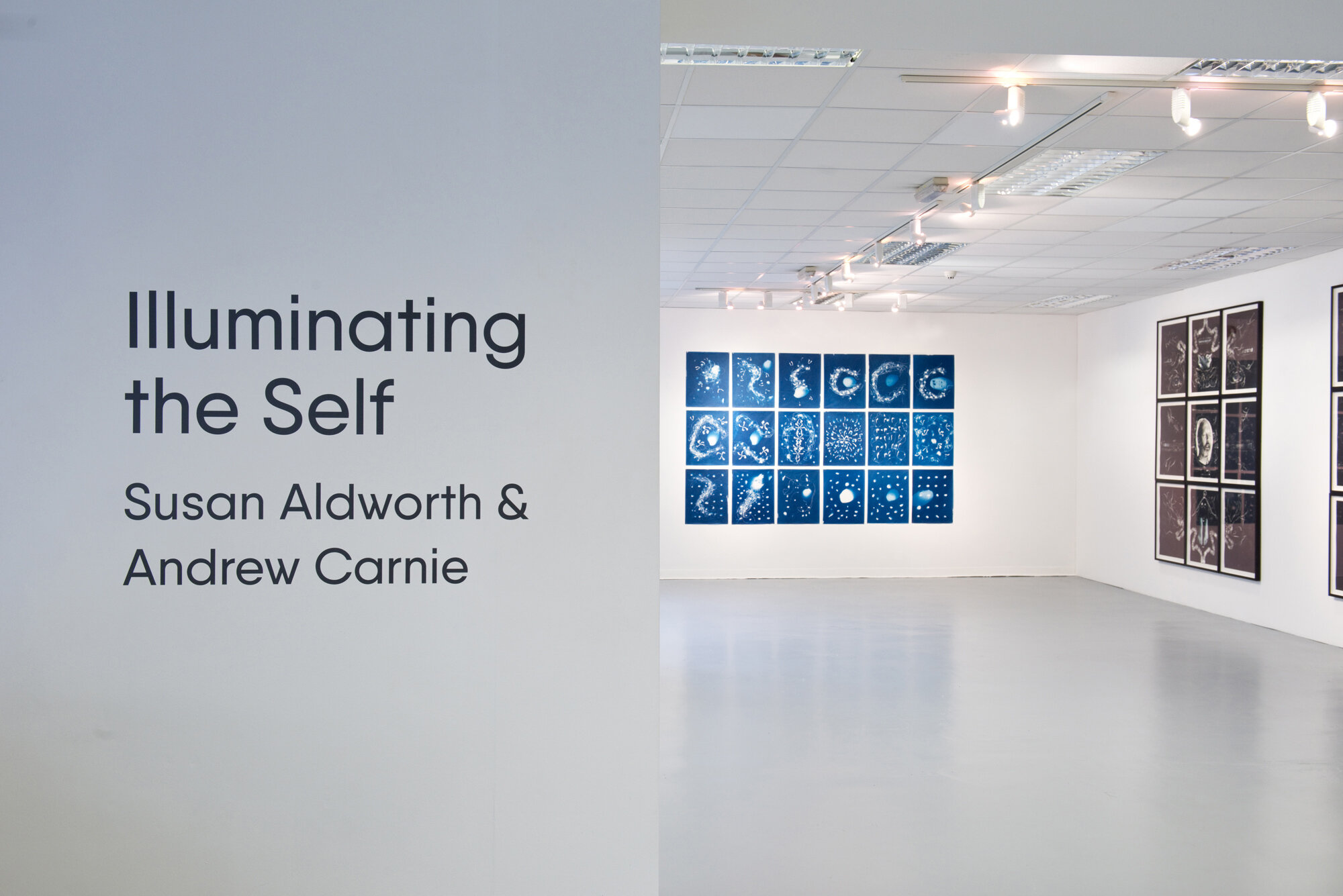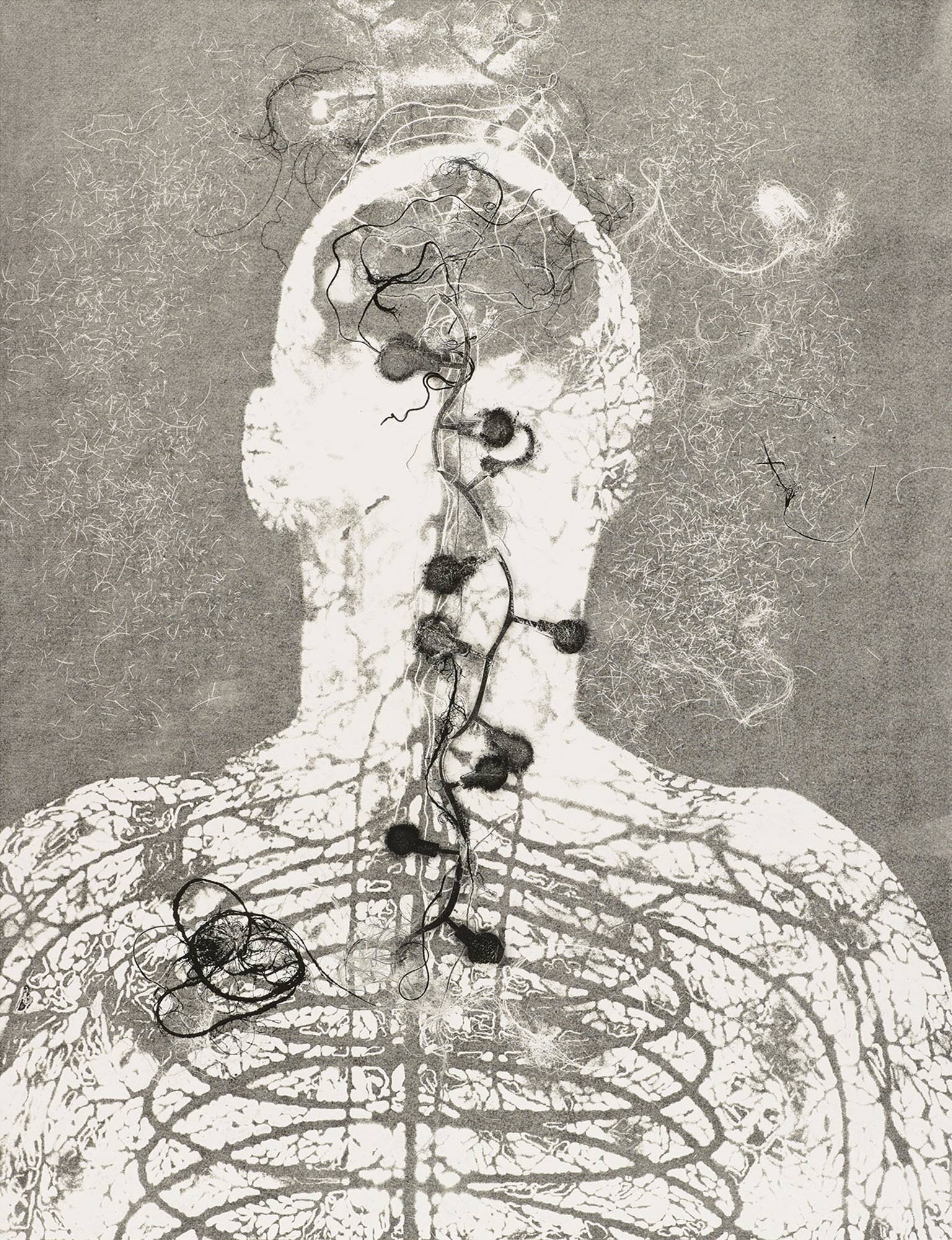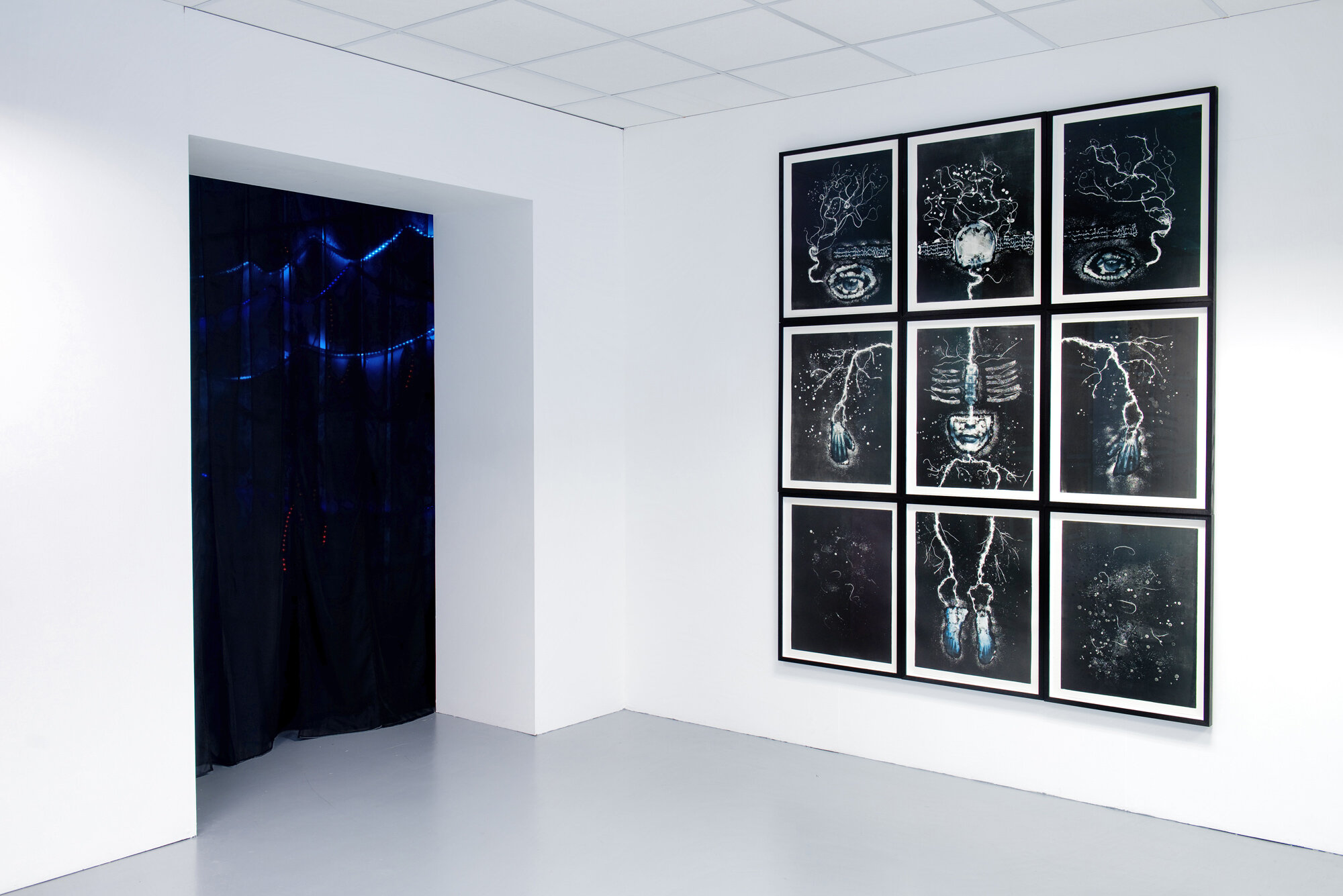Illuminating the Self
Susan Aldworth, Andrew Carnie
16 January – 29 February 2020
Susan Aldworth and Andrew Carnie, Enlightened 6, 2015, monotype, 75x56cm
Susan Aldworth and Andrew Carnie, Enlightened 12, 2015, monotype, 75x56cm
‘Illuminating the Self’ responds to ground-breaking research at Newcastle University into a new treatment for epilepsy. The exhibition consists of artworks by Susan Aldworth and Andrew Carnie that explore different aspects of the university’s CANDO (Controlling Abnormal Network Dynamics using Optogenetics) project.
Optogenetics is a technique that involves the use of light to control cells in living tissue, typically brain cells, that have been genetically modified to be light-sensitive. A parallel exhibition of work by both artists takes place at Hatton Gallery, Newcastle University, running from 18 January to 9 May 2020.
The exhibitions explore the human perspective of living with epilepsy and the neurological processes happening within the brain. Both artists are concerned with the hidden aspects of epilepsy, whether that is revealing the inner workings of the brain or expressing how it feels to have epilepsy.
The exhibition at Vane includes a series of Susan Aldworth’s cyanotypes, Out of the Blue (2019). Cyanotype is a photographic process that produces a cyan-blue print, a process used by architects and engineers well into the 20th century to produce blueprints. Aldworth states: “The cyanotypes are made using ultraviolet light, a process which mirrors the use of light in the optogenetic therapies being developed by the scientists. These prints explore, through pattern, the synchronization that occurs in the brain during an epileptic seizure.”
The Portrait Anatomised (2013) consists of three large-scale monotype prints of three people living with epilepsy. Expanding a notion of contemporary portraiture, Aldworth utilises the illustrative vocabulary of science in her innovative printmaking process. Incorporating the graphic forms of medical textbook imagery, electroencephalograms (EEG) and angiograms, she asks how this material corresponds or contrasts with the subject’s sense of themselves and prompts us to reconsider how we might best understand an individual.
Andrew Carnie’s work for the two exhibitions reflects on the CANDO project’s scientific and engineering aspects whilst also considering some of the ethical and moral questions surrounding it. At Vane, Carnie is showing the video work, A Tale of Two (2019), which consists of a series of ‘bouquets’ of USB programmable word fans, each with texts in blue and red that reflect different aspects of implants and implantation. The texts are in part taken from documents on the legal, ethical, and emotional aspects of implantation: they are in part derived from texts on ‘Everyday Cyborgs’ – people with attached and implanted medical devices such as artificial joint replacements, pacemakers, total artificial hearts, and limb prostheses – as well as Carnie’s own writing.
Storm to Calm: Rockall (2019) is one of a series of kinetic sculptures made by Carnie that are triggered by visitors as they walk through the exhibition. These pieces reflect on the nature of epilepsy, are concerned with balance and stability and how this can be interrupted and realigned. Carnie states: “The role of the audience is critical, as they form a part of the work triggering some of the sculptures’ actions. While focused upon the CANDO research, epilepsy is not an isolated condition, its effects are social as well as medical. While the optogenetics research using light to control cells in living tissue may have an impact beyond epilepsy and upon us all.”
The Enlightened (2015) suite is a series of monotypes, produced jointly by Aldworth and Carnie. In this work, Carnie contributes a human setting, a sense of self as viewed through science while Aldworth portrays the workings of the brain through delicate and urgent line work – a thought happening or a neutron firing.
Susan Aldworth is a visual artist who lives and works in London. She has a background in philosophy, and investigating the workings of the human mind, especially consciousness and our sense of self. Working as an artist-in-residence in a medical or academic setting is central to Aldworth’s practice – she has collaborated with scientists, clinicians and philosophers to investigate the many narratives of sleep, epilepsy, schizophrenia, and consciousness in her explorations into what it means to be human. Her work is held in many public and private collections including the V&A, the British Museum, The Fitzwilliam Museum, The Wellcome Collection Library and Williams College Museum of Contemporary Art, USA. Aldworth is an associate lecturer on the MA Art & Science at Central Saint Martin’s, London. For further information go to www.susanaldworth.com
Andrew Carnie is an artist and academic at Winchester School of Art, Southampton University. His practice often involves meaningful interactions with scientists. He is a member of the Critical Practices Research Group at WSA where his own interests lie in exploring the self, through notions of hybridity, in organ transplantation, immunology, neurology, the brain, and how we get a sense of ourselves through science and images. Carnie’s work has been exhibited at the Science Museum, London, Natural History Museum, Rotterdam, Design Museum, Zurich, Exit Art, New York, Williams College Museum of Art, Williamstown, Great North Museum, Newcastle upon Tyne, Pera Museum, Istanbul, Dresden Hygiene Museum, Morevska Gallery, Brno, and the Daejeon Museum of Art, South Korea. For further information go to www.andrewcarnie.co.uk
CANDO is a world-class, cross-disciplinary project to develop an alternative treatment for some focal epilepsies using light from a small brain implant to modulate abnormal activity and so prevent the development of seizures. The goal of this project is to create a successful first-in-human trial in epilepsy patients. It is a collaboration between Newcastle University, Imperial College London, University College London and The Newcastle upon Tyne Hospitals NHS Foundation Trust. For further information on CANDO go to www.cando.ac.uk
Artist talk: Andrew Carnie: New work from science: Thursday 20 February, 6-7.30pm
To coincide with ‘Illuminating the Self’, Andrew Carnie will discuss his working process and how the new work being shown arose from his discourse with scientists of the CANDO project at the Institute of Neuroscience, Newcastle University, and their work on using optogenetics as a mechanism for solving some of medicine’s most incurable, intractable conditions.
Watch a documentary by filmmaker Alan Fentiman about the exhibition
Take a video tour of the exhibition
Share this page























